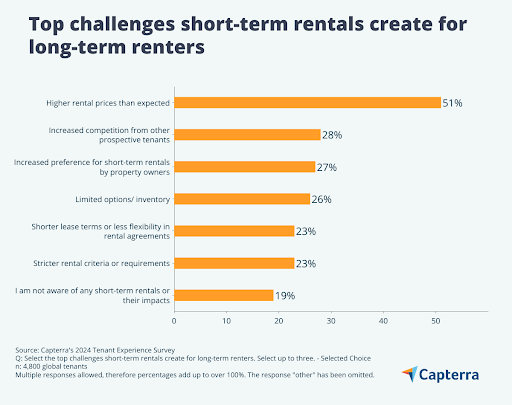With over 75 per cent of tenants worldwide reporting that rising rents have negatively impacted their quality of life, property managers have the opportunity to differentiate themselves by offering competitive rates and using technology to enhance tenant satisfaction and loyalty.
Capterra explored this through its global survey across 12 countries, with 4,800 tenants, including 400 respondents from Canada, to understand their experiences and perceptions. The results reveal a complex mix of factors influencing the short-term rental market, including rising rental costs, neighbourhood disturbances and tenant satisfaction issues. They also highlight the need for property managers to adopt new technologies and property management tools to improve the tenant experience, especially in the face of external factors driving rent increases.
Rising rents due to short-term rentals: A worry for over half of tenants
Globally, 51 per cent of tenants are concerned about rising rental prices due to short-term rentals, with the same sentiment reflected in Canada.
Among Canadian tenants familiar with the issue, 44 per cent believe short-term rentals have significantly driven up local rent prices.

High rent dissatisfaction in Canada
Globally, 34 per cent of tenants are challenged by high rental costs, while 36 per cent express dissatisfaction with their current rent — a number that’s even higher in Canada, with 39 per cent of tenants unhappy with how much they pay for rent.
Additionally, 76 per cent of tenants globally agree that rising rents have negatively impacted their standard of living. These numbers underscore the need for property managers to foster strong, long-term relationships with tenants through transparent communication and fair pricing strategies.
Impact of short-term rentals on neighbourhood dynamics
30 per cent of tenants globally report noise issues due to short-term rentals, while 29 per cent mention parking problems and 24 per cent express safety concerns. Furthermore, 23 per cent have observed changes in neighbourhood character.
The report suggests that property managers should adopt community engagement strategies to address these issues, helping to build a sense of community and improve tenant satisfaction.
Other key findings
The report also cites that 40 per cent of tenants worldwide support rent control, while 30 per cent favour discounts for timely payments to combat rent inflation. As well, 31 per cent of tenants are willing to pay higher rent for properties equipped with home security systems.
How property managers can strengthen neighbourhood communities
The report goes on to suggest six things property managers can do to strengthen their communities:
1. Enhance security. Install security systems, surveillance cameras and access controls to improve safety and foster a community watch culture.
2. Address congestion. Implement traffic calming measures and develop designated parking spots to reduce congestion.
3. Minimize noise disturbances. Enforce quiet hours and invest in soundproofing to address tenant concerns about noise.
4. Improve waste management. Ensure regular trash collection and provide recycling and waste disposal facilities.
5. Preserve neighbourhood character. Engage tenants in beautification projects and community events to foster neighbourhood pride.
6. Build community ties. Partner with local businesses, organize community service projects and promote diversity and inclusivity to create a welcoming environment.
Review the full report here.
















Many good suggestions here for improving long term rentals but saying the problems are attributed to short term rentals does not seem to be backed up by the research.
We’re experiencing inflation and increased home prices worldwide. It seems like a biased study to not consider that as having an effect on increased long term rental rates.
Also long term tenants can have parties and cause noise just as much as short term guests so again this study seems biased attributing many problems to STRs without considering other factors